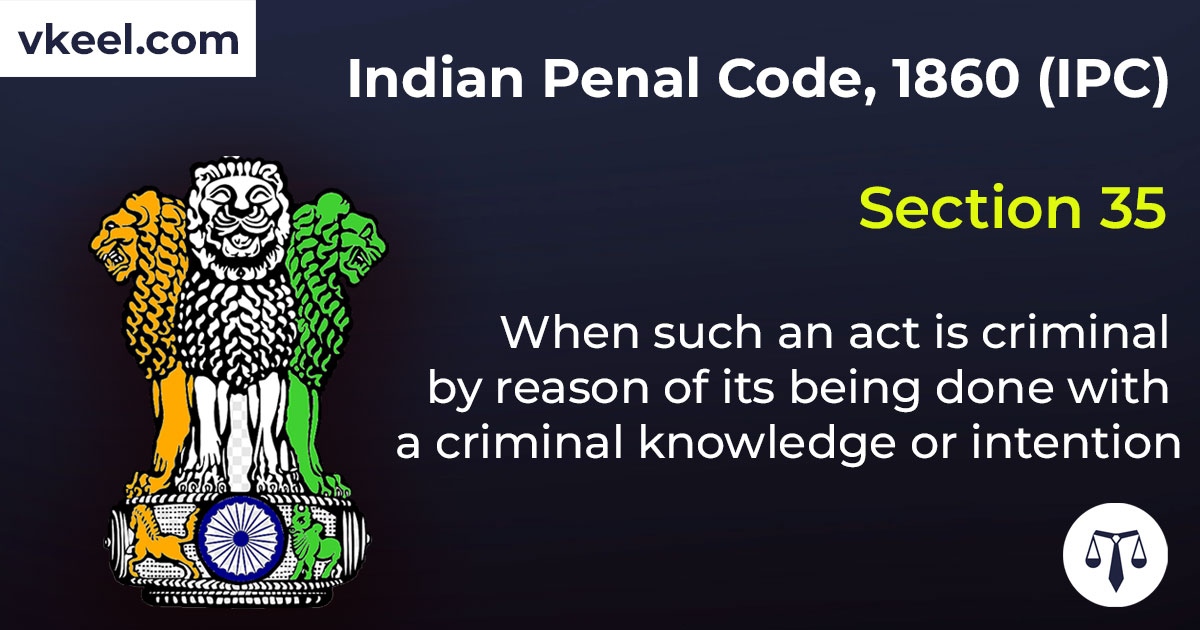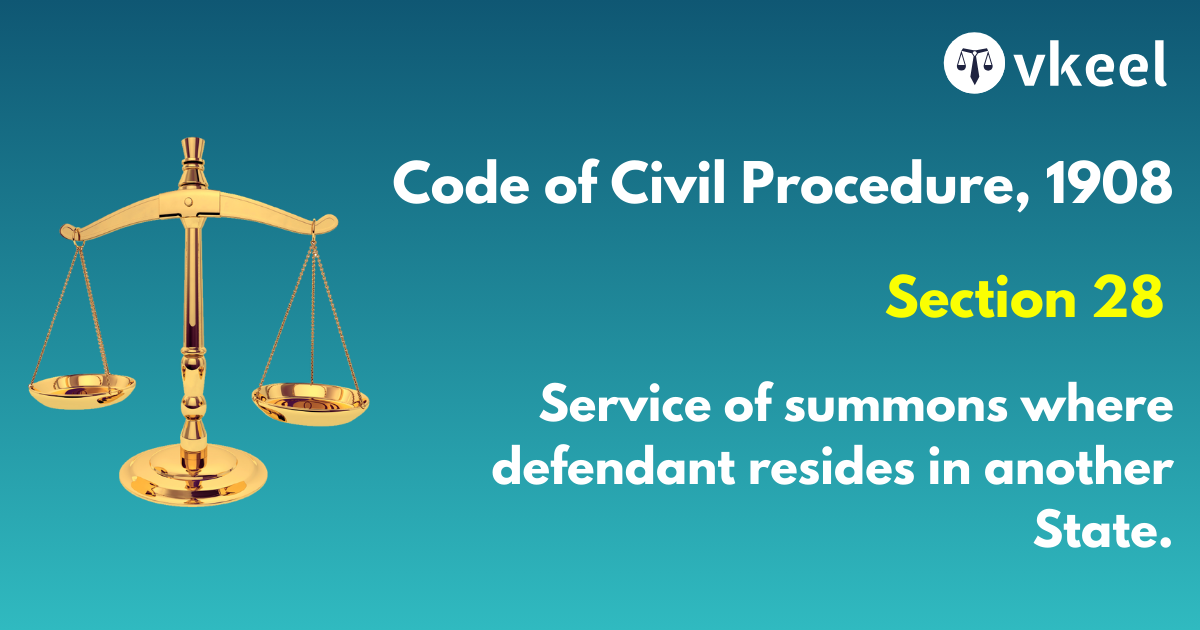Section 35 Indian Penal Code 1860 (IPC) – When such an act is criminal by reason of its being done with a criminal knowledge or intention
By Vkeel Team
Table of Contents
- Description
- What is Section 35 of the Indian Penal Code?
- Interpretation of Section 35
- What is Criminal Intention or Knowledge?
- Criminal Intention or Knowledge in Section 35 of IPC
- Illustration of Section 35 of IPC
- Importance of Section 35 in the Criminal Justice System
- Application of Section 35 in Criminal Cases
- Conclusion
Description
“Section 35 Indian Penal Code 1860 (IPC)”
Whenever an act, which is criminal only by reason of its being done with a criminal knowledge or intention, is done by several persons, each of such persons who joins in the act with such knowledge or intention is liable for the act in the same manner as if the act were done by him alone with that knowledge or intention.
What is Section 35 of the Indian Penal Code?
Section 35 of the IPC states that when a person commits an act that is criminal by reason of its being done with a criminal knowledge or intention, they shall be punished in the same manner as if they had committed the offense intentionally.
This section is important as it clarifies that the intention or knowledge behind an act is crucial in determining criminal liability. A person who commits an offense without knowledge or intention cannot be held criminally liable. However, if the act is committed with knowledge or intention, the person can be punished as if they had committed the offense intentionally.
Interpretation of Section 35
The interpretation of Section 35 is essential in determining the criminal liability of an accused person. The courts have interpreted this section in various cases, and the following are the essential points to consider:
1. Mens rea or guilty mind
The mens rea or guilty mind of an accused person is crucial in determining criminal liability. The court must establish that the accused person had the knowledge or intention to commit the offense. The mere act of committing an offense is not enough to hold a person criminally liable. The prosecution must prove beyond a reasonable doubt that the accused person had the requisite mens rea.
2. Knowledge or intention
The knowledge or intention of an accused person can be inferred from the circumstances of the case. For example, if a person is found with drugs in their possession, it can be inferred that they had the knowledge or intention to possess the drugs. Similarly, if a person is found with a weapon, it can be inferred that they had the knowledge or intention to use the weapon.
3. Punishment
Section 35 states that a person who commits an offense with criminal knowledge or intention shall be punished in the same manner as if they had committed the offense intentionally. This means that the punishment for an offense committed with knowledge or intention is the same as the punishment for an offense committed intentionally.
4. Mistake of fact
A mistake of fact can be a defense to a criminal charge. If an accused person commits an offense based on a mistaken belief, they may not be held criminally liable. However, if the mistake was due to negligence or recklessness, the accused person may still be held criminally liable.
What is Criminal Intention or Knowledge?
Criminal intention or knowledge is an essential ingredient of many criminal offences. It refers to the state of mind of an offender at the time of committing a crime, which may be characterized by an intention to cause harm or knowledge that the act will cause harm. It is important to note that criminal intention or knowledge is not the same as motive. Motive refers to the reason behind committing a crime, while criminal intention or knowledge refers to the mental element of the crime.
Criminal Intention or Knowledge in Section 35 of IPC
Section 35 of the IPC states that when an act is criminal by reason of its being done with a criminal knowledge or intention, a person who does the act with such knowledge or intention shall be guilty of the offence committed. This means that the mental element of the crime is as important as the physical act itself. Thus, even if a person did not actually cause any harm, if they had the requisite criminal intention or knowledge, they can still be held liable for the offence.
Illustration of Section 35 of IPC
To understand this provision better, let us consider an illustration. Suppose a person, A, sets fire to a building with the intention of destroying it. In this case, A’s criminal intention or knowledge is to cause harm to the building. If the building is indeed destroyed, A can be held liable for the offence of arson, even if no one was harmed in the fire. On the other hand, if A sets fire to the building without any intention of causing harm, but the fire accidentally spreads and causes harm, A may not be held liable for the offence of arson, as there was no criminal intention or knowledge.
Importance of Section 35 in the Criminal Justice System
Section 35 is an important provision in the criminal justice system, as it helps to ensure that offenders are held accountable for their actions. It ensures that the mental element of the crime is taken into consideration while determining culpability, and that offenders cannot escape liability by claiming ignorance or lack of intention. It also ensures that the punishment for an offence is commensurate with the level of criminal intention or knowledge of the offender.
Application of Section 35 in Criminal Cases
Section 35 is applicable in a wide range of criminal cases. Let us consider a few examples to understand its application better:
1. Murder:
Murder is an offence that requires the presence of criminal intention or knowledge. If a person causes the death of another person with the intention of causing death or with the knowledge that their act is likely to cause death, they can be held liable for the offence of murder. Section 35 comes into play in such cases, as the intention or knowledge of the offender is crucial in determining culpability.
2. Theft:
Theft is another offence where criminal intention or knowledge is an essential element. If a person takes someone else’s property without their consent, with the intention of permanently depriving them of it, or with the knowledge that their act is likely to result in such deprivation, they can be held liable for the offence of theft. Once again, Section 35 is relevant in such cases, as the intention or knowledge of the offender is crucial in determining culpability.
3. Cheating:
Cheating is an offence that can be committed with criminal intention or knowledge. If a person deceives another person by making false promises or representations, with the intention of causing wrongful gain to themselves or wrongful loss to the other person, they can be held liable for the offence of cheating. Once again, Section 35 is relevant in such cases, as the intention or knowledge of the offender is crucial in determining culpability.
4. Cyber Crimes:
With the increase in the use of technology, cyber crimes have become more prevalent. Cyber crimes can also be committed with criminal intention or knowledge. For example, if a person hacks into someone else’s computer system with the intention of stealing data or causing damage to the system, they can be held liable for the offence of cyber crime. Once again, Section 35 is relevant in such cases, as the intention or knowledge of the offender is crucial in determining culpability.
Conclusion
Section 35 of the IPC is a crucial provision in the criminal justice system, as it lays down that the intention or knowledge of an offender is crucial in determining whether an act is criminal or not. It ensures that offenders are held accountable for their actions, and that the mental element of the crime is taken into consideration while determining culpability. It also ensures that the punishment for an offence is commensurate with the level of criminal intention or knowledge of the offender. Therefore, it is important that both law enforcement agencies and the judiciary understand the significance of Section 35 and apply it appropriately in criminal cases.
Desctiption Source: indiacode
Disclaimer:
The information provided in the article is for general informational purposes only, and is not intended to constitute legal advice or to be relied upon as a substitute for legal advice. Furthermore, any information contained in the article is not guaranteed to be current, complete or accurate. If you require legal advice or representation, you should contact an attorney or law firm directly. We are not responsible for any damages resulting from any reliance on the content of this website.












